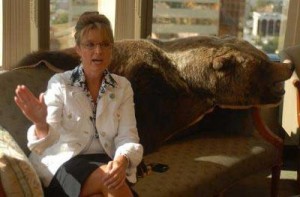By Becci Robbins
SC Progressive Network
She’s only been on the scene five weeks, and I’m suffering severe Sarah fatigue. You know which Sarah. The one tapped by the McCain camp in a cynical attempt to shore up the crippled wing of his fundamentalist base. The one who has been winking and obfuscating her way through a tightly scripted campaign that is relying on style over substance, sound bites over sound public policy.
As a woman, I want to see Sarah Palin do well, knowing that her performance reflects — fairly or not — on all women and our perceived ability to lead. As a feminist, I want to enroll her in a women’s studies program. If she knew her history, she couldn’t so easily impose her anti-choice ideology, wouldn’t presume to know what’s best for all women.
Palin holds an extreme position on reproductive rights, opposing contraception and access to abortion, even for rape victims. And yet she cried foul when reporters dared mention her unmarried pregnant teenage daughter — never mind that Palin’s abstinence-only agenda makes it a legitimate point of discussion. Our government has spent over $1 billion to fund abstinence-only sex education programs since 1996. That approach has failed countless young women, including, apparently, Palin’s own daughter.
Rather than talk about it, Palin simply said that her children should be off limits. But in the vice-presidential debate she repeatedly mentioned her son in Iraq and her special-needs child. She did not mention her pregnant daughter. Apparently it’s okay to talk about her kids as long as they serve the campaign’s interest.
Yes, Palin proudly touts her pro-life credentials. While she sits in her office on a couch covered with a bear skin, the head still attached. While she shows off photos of her and her four-year-old daughter posing with the caribou she shot. While advocating hunting wild game from the safety of a low-flying aircraft.

When Palin talks about life, she is referring to pre-born human life. Not the lives of grown women. Not the lives of children her running mate would deny health care. Not, certainly, the lives of the animals with whom we share this planet. Not even the life of the planet itself, which will continue to suffer the devastating effect of America’s petroleum addiction, which Palin advocates when she gleefully chants, as she did in the debate, “Drill, baby, drill!”
The debate was little more than cheap theater. The McCain camp had negotiated its terms, in effect dumbing down the debate. The contract limited the candidates’ responses to 90 seconds, discouraged the moderator from asking follow-up questions, and prohibited the candidates from asking each other questions. The format helped ward off the sort of embarrassment an unscripted Palin revealed in recent network television interviews.
Instead of an honest debate, we had Sen. Joe Biden biting his tongue — warned by his handlers to play nice — and Gov. Palin ignoring the moderator’s questions and providing instead well-worn one-liners, off topic and sometimes off the wall. She was like a Chatty Cathy doll programmed with conservative talking points. Pull the string, and she spouts a few sentences.
Fortunately, I’m not the only one underwhelmed by her performance. A number of conservative pundits have grudgingly admitted that Palin is not ready to be a heartbeat away from the presidency. Kathleen Parker’s Sept. 26 editorial, in which she suggested Palin pull herself out of the race, garnered the most attention. “If BS were currency,” Parker wrote, “Palin could bail out Wall Street herself.” If she were a man, she continued, we’d be laughing; but since she’s the first woman on a Republican presidential ticket, we can’t say the painful truth.
In earlier editorials, Parker was Palin’s biggest cheerleader. “Palin is everything liberals have always purported to want for women — freedom to choose, opportunities for both career and family, a shot at the top ranks of American political life,” she wrote. “With five children and an impressive resume, Palin should be Miss July in the go-girl calendar.”
In an editorial she wrote after the Republican convention, she gushed, “No one is going to be embarrassed by John McCain’s maverick pick.”
What a difference a few weeks make.
And in a twist of irony, the pundit who has made a career out of skewering the opposition with barbs aimed, more often than not, at women on the Left, got a taste of her own venom. After her editorial pleading for Palin to pull out of the race, she found herself on the receiving end of her party’s most rabidly partisan element. In her latest piece, she writes about being called an idiot, a traitor, about people writing angry and threatening letters.
Surprised and dismayed, she writes, “Anyone who dares express an opinion that runs counter to the party line will be silenced. That doesn’t sound American to me.”
Sadly, that is the America she helped create.
There are lessons here for us all. May we learn them before it is too late.

